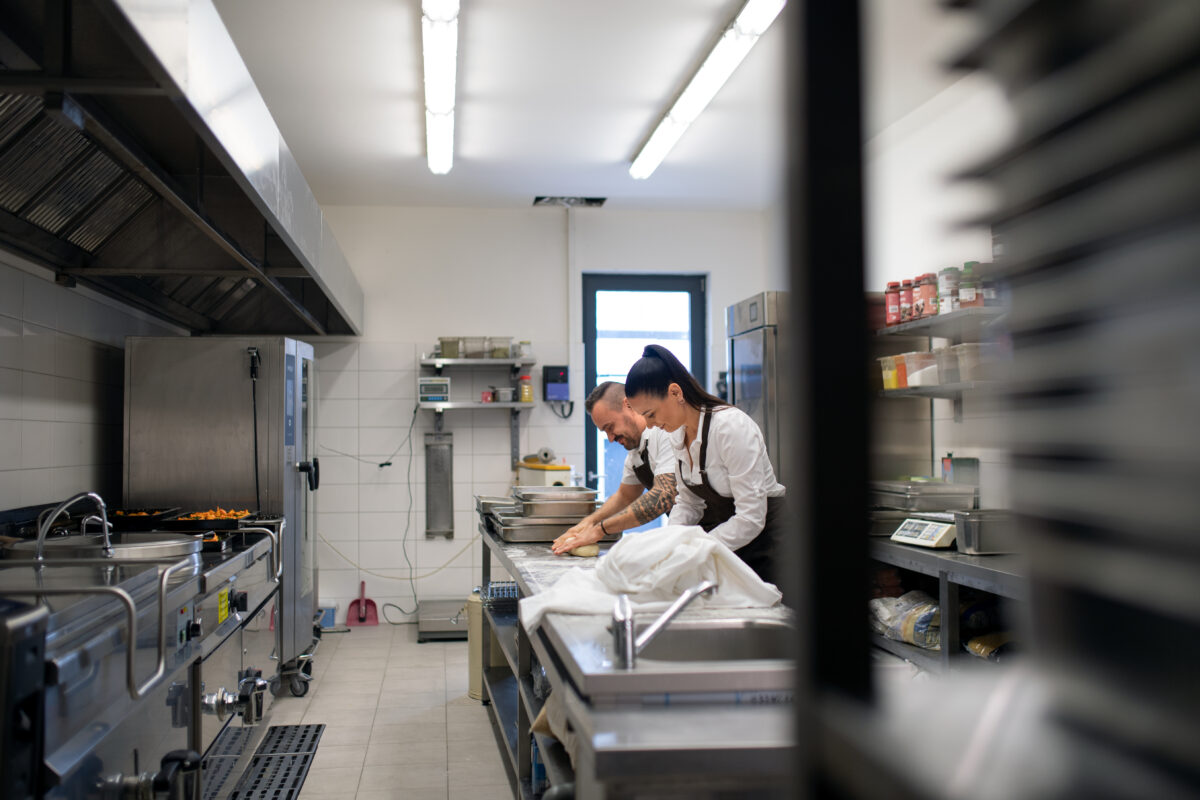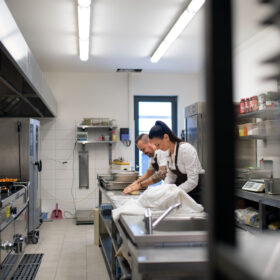Effective Techniques for Assembling a Top-Tier Hospitality Team
In the ever-changing world of hospitality, having a high-performing team is crucial. A skilled and unified team is essential for success, whether in a large hotel, a quaint bed and breakfast, or a lively restaurant. Each team member contributes uniquely, much like musicians in an orchestra, to create memorable guest experiences. Their sincere hospitality and efficiency delight guests and encourage repeat visits and positive word-of-mouth.
To form such a team, careful selection is key. Look for candidates who not only have the necessary technical abilities but also a genuine passion for service. Regular training updates their skills and knowledge. Practices like effective communication and team-building activities foster trust and a united goal. Recognising and rewarding their efforts also keeps the team motivated.

Nurturing a Culture of Excellence and Boosting Employee Engagement
Leadership’s Impact on Positive Workplace Culture
Strong leadership is the foundation of a culture of excellence and employee engagement. Effective leaders shape the organisation’s culture, driving it towards positivity. They inspire and motivate their teams by setting a good example in their conduct and communication. Open and honest communication from leaders helps build a sense of community among employees.
Exceptional leaders empower their staff, giving them responsibilities and a voice in decision-making. They foster an environment where creativity and innovation are welcomed, enabling individuals to excel and contribute significantly. Leaders build trust by showing empathy and understanding, helping employees realise their full potential.
Acknowledging and Rewarding Employee Efforts
Acknowledging and rewarding employees are key to sustaining a culture of excellence. Recognition programs celebrate individuals’ and teams’ hard work and accomplishments, reinforcing a positive workplace. Publicly acknowledging these successes lifts morale and encourages others to excel.
Incentive programs motivate employees to exceed expectations. Rewards can vary from financial bonuses to non-monetary benefits like additional vacation days, professional growth opportunities, or public acclaim. Personalising rewards shows employees they are valued, keeping them engaged and committed.
Prioritising Work-Life Balance and Well-being
A culture of excellence places importance on employee well-being and work-life balance. Promoting balance helps prevent burnout and improves job satisfaction. Flexible schedules, remote work options, and ample vacation time help employees balance their personal and professional lives.
Initiatives focused on employee well-being, such as wellness programs, fitness incentives, and mental health support, show genuine care for employees’ health and happiness. Access to stress management and self-care resources builds a more resilient and engaged workforce.
Optimising Team Communication and Collaboration in Hospitality
Creating a Culture of Open Communication
A team’s success in the fast-paced hospitality industry hinges on effective communication. Creating open communication channels is crucial for building transparency and trust within the team. Encouraging an atmosphere where all employees, regardless of their position, can openly share their ideas and concerns is key. Communication tools such as messaging apps, emails, and collaborative software ensure efficient information flow and timely updates.
Prioritising Regular Team Gatherings
Regular team gatherings, including meetings and quick huddles, are vital in maintaining alignment and motivation. These sessions offer a platform to discuss progress, tackle challenges, and celebrate group achievements. Brainstorming during these meetings can spark innovative ideas and enhance team unity. Brief huddles provide essential updates and boost team spirit, especially before shifts or events.
Encouraging Collaboration Across Different Functions
Encouraging collaboration across different functions breaks down barriers and enriches the team’s dynamic. When departments work together on projects, it leads to a deeper understanding of the business and its goals. This cross-functional cooperation brings varied perspectives, fostering creative solutions and better service. Organising team-building activities outside of work also strengthens interpersonal relationships and fosters a sense of unity and common purpose.

Fostering Diversity and Inclusion
Valuing Diversity in the Workplace
In today’s progressive hospitality industry, promoting diversity and inclusion is ethical and key to success. Valuing diversity means creating a workplace that respects differences in race, ethnicity, gender, age, sexual orientation, and abilities. Diverse teams bring various perspectives, enhancing creativity and problem-solving.
Leaders should actively cultivate an inclusive culture where every employee feels valued. Encouraging open discussions on diversity and inclusivity enables employees to express their unique perspectives freely. Initiatives like affinity groups and diversity training facilitate understanding and dialogue among team members.
Reducing Bias in Recruitment and Advancement
Eliminating bias in recruitment and promotions is crucial for fairness. Blind recruitment processes, where personal details are obscured, help to reduce unconscious biases. Structured interviews and standardised evaluation criteria also diminish subjective decision-making.
Promotions should be merit-based, focusing on performance and achievements. Transparent criteria for advancement ensure fair recognition and reward based on individual contributions to the organisation.
Creating a Supportive and Inclusive Environment
A supportive environment is fundamental to inclusivity in the workplace. Respect, empathy, and understanding should be evident in interactions between leaders and staff. Prompt and sensitive handling of discrimination or harassment incidents reinforces a zero-tolerance policy.
Policies like flexible working arrangements and specific accommodations promote a sense of belonging and well-being. Employee resource groups and mentorship programs offer additional support, particularly to underrepresented groups.
Effective Strategies for Assessing and Improving Team Performance in Hospitality
Establishing Clear Performance Benchmarks
Effectively monitoring and measuring team performance in the hospitality industry begins with setting precise Key Performance Indicators (KPIs). These KPIs serve as defined benchmarks for team success and can include various measures like customer satisfaction ratings, revenue goals, or efficiency levels.
Conducting Consistent Performance Reviews
Regular evaluations are crucial to effectively track and assess team progress. Periodic reviews provide a platform to gauge the team’s performance against established KPIs. These assessments are instrumental in pinpointing strengths and identifying areas needing enhancement, offering a comprehensive view of the team’s efficacy.
Utilising Data for Team Enhancement
Making improvements based on data analysis is fundamental in optimising team performance. Analysing data from performance evaluations and KPI metrics allows leaders to make well-informed improvements. Spotting trends and patterns in the data enables the implementation of focused improvement strategies and continuous enhancement.

Encouraging and Acknowledging Outstanding Performance
Establishing a Results-Oriented Reward System
To encourage excellence, it’s essential to recognise and reward exceptional performance. A results-oriented reward system aligns employee efforts with the goals of the organisation. By tying rewards to specific achievements and key performance indicators, employees are motivated to exceed expectations in their roles.
Offering merit-based bonuses, salary increases, or commissions for outstanding results provides tangible motivation. This approach cultivates a competitive yet healthy environment, encouraging continual performance enhancement.
Acknowledging Successes and Significant Milestones
Acknowledging team members’ successes and milestones is crucial in fostering a culture of excellence and positivity. Public recognition, like employee spotlights or appreciation events, honours their hard work and commitment. These acknowledgements boost morale and inspire others to aim for excellence.
Celebrating important events such as work anniversaries or project completions shows the organisation’s gratitude for its team’s loyalty and hard work. Recognising these moments helps build employees’ strong sense of belonging and pride.
Offering Career Growth and Advancement Opportunities
Recognising excellence isn’t limited to financial rewards; it also involves providing opportunities for career advancement and professional growth. Career development programs, mentorship opportunities, and access to internal job postings enable employees to see a long-term career path within the organisation.
These advancement opportunities increase job satisfaction and aid in retaining staff. A clear growth trajectory and the organisation’s investment in their development keep employees motivated and loyal.
Drawing Exceptional Talent to Your Hospitality Venture
Developing an Appealing Employer Identity
In a competitive market, attracting top talent requires an appealing employer brand. Promote a workplace culture centred on care, work-life balance, and personal growth. Showcase opportunities for creativity and innovation, making your business a place where ambitions can flourish. Stress your commitment to social responsibility, sustainability, and ethical practices to attract candidates driven by purpose.
Writing Engaging Job Advertisements
Compose job adverts that capture attention and imagination. Describe the exciting challenges and opportunities for advancement within your company. Emphasise perks like flexible working hours and being part of a skilled team. Use language that aligns with the ambitions of high-caliber candidates.
Using Employee Recommendations and Networking
Utilise your best employees as brand representatives. Offer incentives for successful referrals. Attend hospitality events and industry meet-ups to network with potential talent.
Thorough Recruitment and Selection
Pinpointing Essential Competencies and Abilities
Effective recruitment starts with identifying the vital skills and competencies needed. Understand the specific roles and duties within your establishment. Work with department leaders and top performers to pinpoint the qualities contributing to outstanding service.
Adaptability, effective communication, and problem-solving skills are typically vital in hospitality. Interpersonal skills, customer focus, and an eye for detail are critical for enhancing guest experiences. For some roles, being tech-savvy or multilingual may be important.
Implementing Behavioural Interviews and Skills Assessments
Behavioural interviews provide insights into a candidate’s past actions, which can indicate their future performance. Ask questions about how they’ve handled typical hospitality challenges. Encourage sharing specific examples showcasing their problem-solving, teamwork, and conflict resolution.
Complement interviews with skill assessments tailored to each role. For instance, front-line staff might participate in customer service simulations, while management candidates might engage in leadership exercises.
Using Data in Hiring Decisions
Employ data-driven approaches in your hiring process for more informed decisions. Set measurable standards for evaluating candidates based on their interview and assessment performances. Use rating scales for objective analysis.
Implement applicant tracking systems for organising and analysing candidate information. These systems help identify patterns and streamline the selection process. Combine feedback from various interviewers for a comprehensive evaluation of each candidate.
Training and Development for Skill Improvement
Identifying and Addressing Training Needs and Skill Gaps
Identifying training needs and skill gaps is crucial in the hospitality industry to stay competitive. Regular evaluations of employee performance and feedback from managers and colleagues help pinpoint areas needing improvement. This ensures that training is focused, effective, and tailored to individual needs.
Conducting Continuous Training and Workshops
Continuous training programs and workshops are vital for enhancing skills and staying current with industry trends. These programs enable employees to upgrade their skills, covering everything from technical abilities like customer service to soft skills like communication. Hands-on workshops and experiential learning encourage active participation and real-world application. Cross-training initiatives promote versatility, allowing team members to contribute in different areas of the business.
Promoting Professional Growth and Advancement
Supporting professional development and career advancement is an effective way to retain and motivate employees. Access to courses, certifications, and seminars allows employees to follow their interests and broaden their skills. This support fosters loyalty as employees feel the organisation values their long-term success.
Offering internal promotion opportunities gives employees clear career goals and pathways. Promoting from within the organisation encourages a culture of internal growth and merit-based advancement.

Developing Trust and Responsibility Within the Team
Promoting Open and Honest Communication
Building trust within a team begins with promoting open and honest communication. Team members engaging in transparent exchanges cultivate an environment of trust and respect. Leaders should model this behaviour, openly discussing objectives, challenges, and decisions. Valuing diverse opinions and welcoming feedback creates a culture where everyone feels valued and heard. This openness also aids in proactive conflict resolution and minimises misunderstandings.
Delegating Tasks and Empowering Individuals
Cultivating accountability involves delegating tasks and empowering team members. Assigning responsibilities shows confidence in their abilities and encourages optimal performance. Setting clear expectations and achievable goals helps team members understand their roles and responsibilities. Empowerment means giving them the autonomy to make decisions and allowing them to contribute their unique skills and knowledge.
Conducting Regular Reviews and Feedback Sessions
Regular performance reviews and feedback sessions are essential for promoting accountability and ongoing development. These reviews offer chances to acknowledge accomplishments and pinpoint areas for improvement. Constructive feedback addresses challenges and guides professional growth. These sessions also provide a platform for team members to express concerns and seek guidance from leaders.
Managing and Resolving Team Conflicts
Prompt and Effective Conflict Resolution
In the dynamic world of hospitality, resolving team conflicts swiftly and constructively is key to maintaining a cohesive and efficient team. Tackling conflicts as they arise prevents them from escalating and negatively impacting team dynamics.
Leaders should foster open communication, listening to all parties to understand the conflict’s root cause. Mediating discussions and finding solutions that satisfy everyone involved strengthens trust and respect.
Advocating for Mediation and Conflict Resolution Skills
Promoting mediation and offering conflict resolution training gives team members the tools to handle disputes independently. Employing internal or external mediators can facilitate meaningful discussions, guiding teams to mutually beneficial solutions.
Training in conflict resolution helps employees communicate their needs assertively while understanding others’ viewpoints. These skills enhance communication and understanding, reducing future conflicts.
Cultivating a Team Environment Conducive to Harmony
Creating a team environment based on mutual respect, trust, and support is essential for effective conflict management. Activities that promote team bonding and collaboration strengthen interpersonal relationships and foster a sense of unity.
In an environment where team members respect and support one another, conflicts are more likely to be approached with a constructive and solution-focused mindset, leading to positive resolutions.
Prioritising Adaptability, Flexibility, and Inclusivity in Hospitality
Adapting to Industry Changes in Hospitality
Success in the hospitality sector hinges on adaptability and flexibility. Embracing and navigating changes requires a mindset open to innovation and new trends. Leaders should actively endorse adaptability, creating an environment that embraces rather than resists change.
Staying abreast of industry developments, technological advances, and evolving customer preferences is key to reacting quickly and effectively. Adjusting operations and services to meet market changes keeps the business competitive and relevant.
Cultivating Agile Teams for Unexpected Challenges
In the hospitality industry, having agile teams capable of handling unforeseen challenges is vital. Agility enables employees to think independently, make quick decisions, and work collaboratively. Training staff to remain calm during crises and to see obstacles as opportunities enhances their quick adaptation skills.
Promoting cross-training and diverse skill development increases team versatility, allowing members to fulfil various roles as needed. Versatile team members who can switch between tasks and departments are integral to a resilient workforce.
Encouraging Ongoing Learning and Personal Growth
Continual learning and growth are essential for adaptability. Access to educational resources like workshops, online courses, and industry conferences equips employees with the necessary skills and knowledge. Encouraging a mindset that views challenges as opportunities for learning motivates ongoing personal and professional development. Recognising and rewarding dedication to learning underscores the importance of adaptability in the team.
Conclusion
Crafting a high-performance hospitality team requires a blend of strategic approaches. Begin with developing an attractive employer brand that highlights a nurturing and mission-driven environment. Craft job listings that attract suitable candidates by emphasising opportunities for growth and unique benefits. Use employee referrals and networking as tools to reach top talent.
Ongoing skill development is crucial; identify training needs, introduce continuous training programs, and promote career advancement. Emphasise the importance of adaptability and flexibility to adapt to changes in the industry effectively.
Employing these tactics paves the way for sustained success and growth. Building a high-performance hospitality team leads to a resilient, adaptable workforce capable of excelling in challenging situations. A united team with a shared purpose ensures exceptional guest experiences, propelling the business forward in the dynamic world of hospitality.





